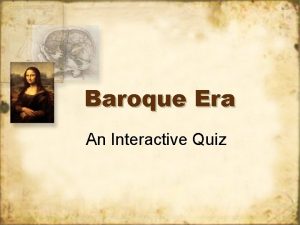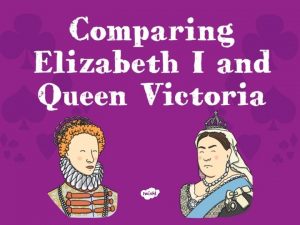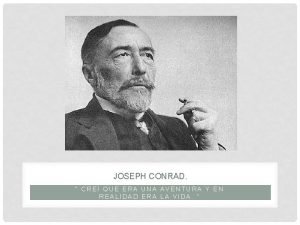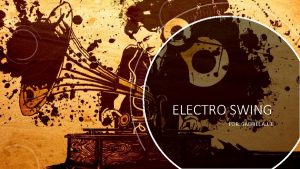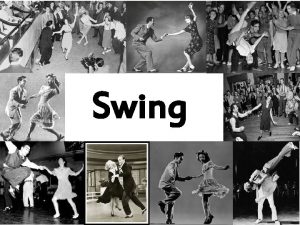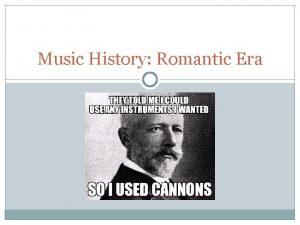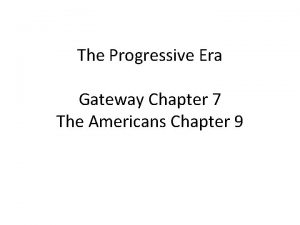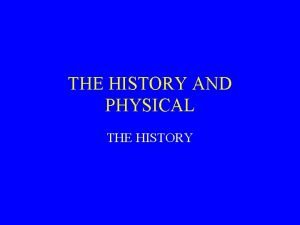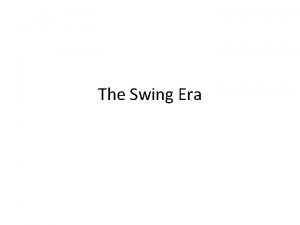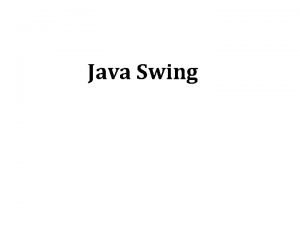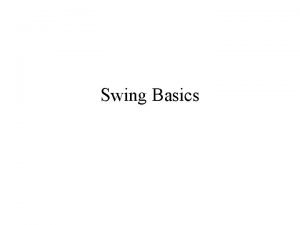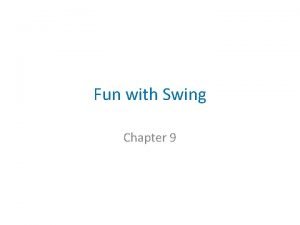The History of Swing The Swing Era was












- Slides: 12

The History of Swing

The Swing Era was the period of time around 1935 – 1946.

Swing music is a music that is commonly known as an upbeat, joyful with a driving forward momentum. The music is usually in 4/4 or 4/8 timing with the emphasis on the even beats. In its purest form it is a flexible platform from which individual musicians can be creative while still contributing harmoniously to the whole.

1935 On August 21 st, 1935 the Goodmans Band arrived at the Palomar Ballroom and opened the performance with the only songs that were positively received by the audiences.

Soon after the Palomar Ballroom performance, and the media's commentary on the performance, Benny Goodman's band has taken the top 3 spots on the record charts in California. Benny Goodman was now being billed as the "King of Swing" and the Palomar Ballroom performance of August 21 st, 1935 would later mark the official start of the Swing Era.

Swing jazz soon came to dominate the American social world. Every country club, night club, ballroom, radio, and the background music of the movies was filled with swing jazz. People foxtrotted to the sweet swing jazz tunes, and people were Lindy Hopping to the hot swing jazz tunes.

Some Popular Swing Songs were; "Begin the Beguine" written by Cole Porter, recorded by Artie Shaw "Bei Mir Bist Du Schön" by the Andrews Sisters with Vic Schoen and his Orchestra "Body and Soul" by Coleman Hawkins, music by Johnny Green and lyrics by Frank Eyton, Edward Heyman and Robert Sour "Chattanooga Choo" by Glenn Miller and His Orchestra and featured in the 1941 movie "Sun Valley Serenade" "Cherokee" by Charlie Barnet, music and lyrics by Ray Noble "Daddy From Georgia Way" recorded by Bob Chester and His Orchestra on Columbia Records, lyrics and music by Daisy Lawton, a pen name for Gloria Parker "Goody" by Benny Goodman and His Orchestra (with vocalist Helen Ward) "HEY! Here Comes That Mood" recorded by Vincent Lopez, music and lyrics by Gloria Parker

During World War 2, swing remained popular, and both large and small ensembles toured with the USO to entertain at Army and Navy camps. The USO brought a piece of home and normality to the soldiers and sailors dealing with the stress of war, away from home and family.

After World War 2 and of what became known as the Great Depression, people did not want to be reminded of either of them. Swing, which became popular during the depression and was so popular when the war started, became a reminder of those bad years. With the bad memories and the bad emotions that swing music brought back to mind, people simply stopped listening.

With that the Swing Era was dead.

Bibliography linked here - http: //padlet. com/india/swingmusic

By India Wilkes
 Era quiz: the baroque era
Era quiz: the baroque era Victorian era vs elizabethan era
Victorian era vs elizabethan era Creí que era una aventura y en realidad era la vida
Creí que era una aventura y en realidad era la vida Poema sobre as estrelas
Poema sobre as estrelas Electro swing history
Electro swing history History of swing music
History of swing music The deliberate intent to draw creative inspiration
The deliberate intent to draw creative inspiration Gateway to us history chapter 7 the progressive era
Gateway to us history chapter 7 the progressive era Physical education during primitive era
Physical education during primitive era History also history physical
History also history physical Hình ảnh bộ gõ cơ thể búng tay
Hình ảnh bộ gõ cơ thể búng tay Ng-html
Ng-html Bổ thể
Bổ thể
